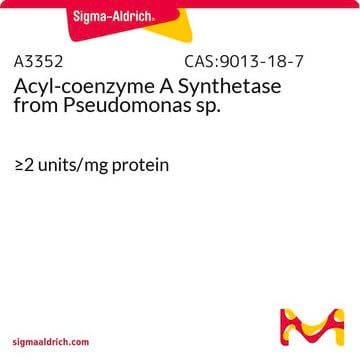A1765
S-Acetyl-coenzyme A synthetase from baker′s yeast (S. cerevisiae)
lyophilized powder, ≥3 units/mg protein
Synonyme(s) :
Acetate CoA ligase (AMP forming), Acetate thiokinase
About This Item
Produits recommandés
Forme
lyophilized powder
Niveau de qualité
Activité spécifique
≥3 units/mg protein
Composition
Protein, 10-30% biuret
Température de stockage
−20°C
Vous recherchez des produits similaires ? Visite Guide de comparaison des produits
Application
Actions biochimiques/physiologiques
Conditionnement
Définition de l'unité
Forme physique
Mention d'avertissement
Danger
Mentions de danger
Conseils de prudence
Classification des risques
Resp. Sens. 1
Code de la classe de stockage
11 - Combustible Solids
Classe de danger pour l'eau (WGK)
WGK 1
Point d'éclair (°F)
Not applicable
Point d'éclair (°C)
Not applicable
Équipement de protection individuelle
Eyeshields, Gloves, type N95 (US)
Faites votre choix parmi les versions les plus récentes :
Certificats d'analyse (COA)
Vous ne trouvez pas la bonne version ?
Si vous avez besoin d'une version particulière, vous pouvez rechercher un certificat spécifique par le numéro de lot.
Déjà en possession de ce produit ?
Retrouvez la documentation relative aux produits que vous avez récemment achetés dans la Bibliothèque de documents.
Les clients ont également consulté
Articles
Enzyme Reagent Coenzyme A (CoA, CoASH or HSCoA) is the key cofactor in first step of the TCA cycle, responsible for transferring the acetyl group from pyruvate oxidation to oxaloacetate yielding citrate. Available through Sigma-Aldrich online.
Enzyme Reagent Coenzyme A (CoA, CoASH or HSCoA) is the key cofactor in first step of the TCA cycle, responsible for transferring the acetyl group from pyruvate oxidation to oxaloacetate yielding citrate. Available through Sigma-Aldrich online.
Enzyme Reagent Coenzyme A (CoA, CoASH or HSCoA) is the key cofactor in first step of the TCA cycle, responsible for transferring the acetyl group from pyruvate oxidation to oxaloacetate yielding citrate. Available through Sigma-Aldrich online.
Enzyme Reagent Coenzyme A (CoA, CoASH or HSCoA) is the key cofactor in first step of the TCA cycle, responsible for transferring the acetyl group from pyruvate oxidation to oxaloacetate yielding citrate. Available through Sigma-Aldrich online.
Notre équipe de scientifiques dispose d'une expérience dans tous les secteurs de la recherche, notamment en sciences de la vie, science des matériaux, synthèse chimique, chromatographie, analyse et dans de nombreux autres domaines..
Contacter notre Service technique









